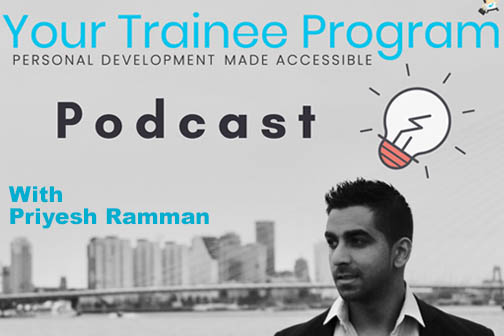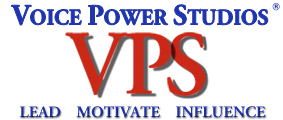Recently I was asked to talk about voice, speaking and communication with Priyesh Ramman for his podcast, Your Trainee Program.
Priyesh represents, to me, the exact type of client I like to work with: someone eager, ambitious, openminded, self-aware, and willing to put in the time and effort it takes to change one’s speaking voice for the better.
Priyesh believes that it’s not only knowledge that leads to power, but that human interaction is the key to getting ahead, finding out what your true path is, being more effective at what you do. Priyesh, then, was already more amenable to working on the how as the what.
How means that you have to say the right thing, of course—that’s the what—but what really matters is the how: you have to say it well. How you say something is often more important than what you say. Studies have shown that what listeners really take away from a conversation or a speech is based 80 percent on one’s voice tone and 20 percent on the actual words.
 What I also like about Priyesh was that he brought up the fact that for him, and this is something common to most of my clients, he admitted in our talk that he’d taken many many communications classes in his 31 years yet not one of them had taught him the value of how you say things. How you speak. How critical one’s voice is to getting one’s message across to others. Especially getting it across to people who do not know you. Groups of people. Crowds of people. And not just people in one room but now, two or more people on your screen.
What I also like about Priyesh was that he brought up the fact that for him, and this is something common to most of my clients, he admitted in our talk that he’d taken many many communications classes in his 31 years yet not one of them had taught him the value of how you say things. How you speak. How critical one’s voice is to getting one’s message across to others. Especially getting it across to people who do not know you. Groups of people. Crowds of people. And not just people in one room but now, two or more people on your screen.
This, unfortunately, is the usual experience for many if not most people—clients, yes, but the usual case for anyone who’s taken a course or a workshop on public speaking or on giving presentations or being a more effective communicator. These classes and exercises tend to focus more on what you’re saying than how you’re saying it. Which is missing the point.
After all, as Priyesh and I talked about on this podcast: Why do we talk to each other? What is the point of a speech or a presentation—in person, over the phone, on Zoom or Google Meets or wherever? The reason we talk to others isn’t just informational, it’s to connect with other people. Words are obviously the what, of course, but people can’t feel you just through your words. Which, again, is where the how comes in. How we speak is crucial in connecting to other people.
Priyesh and I covered a lot in our 30 or so minutes together (he’s based in the Netherlands, and we conducted our interview over the phone; and we connected quite well with each other). We talked about the way cultures affect how we speak. The impact of accents, mumbling, talking too fast, talking too slow, singing, and many other areas of voice and speaking.
As Priyesh said at one point, What you are telling us right now sounds so easy. But you don’t just wake up one day and have an intentional voice.
Which is when I pointed out to him that even for people we consider beautiful natural speakers, these people don’t just get up and extemporize, they practice their speaking. I used opera singers as an example. They have some of the most engaging and articulate voices on the planet. But the Placido Domingos, Andrea Bocellis, and Leontyne Prices of the world, these people who have such naturally good voices, they work at it. Constantly. They continually work at their craft, their gift.
So, as I told Priyesh, it’s the way people use their voice—that is what I deal with.
Which was when Priyesh talked about having to “learn to slow down and pause. I wasn’t used to pausing during my sentences when I spoke . . . but when I did it, I made a connection with my audience and my message was getting across better.”
The goal of Priyesh’s podcast is personal development. Not just business development but becoming the most effective person for you. So he has subtitled his podcast, “personal development made accessible.” The whole gist, then, of our conversation wasn’t just to talk about what I do for others, but to get across to listeners the value of speaking to their development—as individuals, as better business colleagues, as leaders. And to make their speaking voice, and what they’re speaking about, more accessible to everyone—not just to future CEOs or future corporate titans.
What was interesting about the podcast was that Priyesh, because he is so open and honest and self-aware, and even better, so thoughtful and inquisitive—he was like working with an excellent client. So his podcast gave his listeners, and me, the perspective of a client. It was like talking to a client about what challenges them when they speak. And this seemed to fit in quite nicely with Priyesh’s goals—again, the primary one being accessibility. Priyesh most of all isn’t just after self-improvement, he wants to share. He wants his listeners to take action.
If you’d like to listen to our conversation, you can link to it here:
https://open.spotify.com/episode/7AifBFTbPEDzgORZuSwynC?si=pW7TTe7ER7mQHsMS-sH-fQ&nd=1
Give it a listen. I’d love to know what you think of it.
